Read Reviews
The Best Cordless Drills
-
Best combi drill starter kit - Bosch PSB1800 18V Cordless Hammer Drill
-
Best drill driver for beginners - Terratek 18V Cordless Drill Driver Kit
-
Best combi drill for torque control - Ryobi R18PD3-215GZ 18V Cordless Hammer Drill
-
Best combi drill for beginners - BLACK+DECKER BCD700S1K Lithium Ion 2 Gear Hammer Drill
-
Best cordless drill option - Makita DHP484Z 18V Combi Drill BL LXT
-
Best cordless drill for professionals - Dewalt DCD796N 18V XR Li-Ion Brushless Compact Combi Drill
-
Best small drill driver - Hychika DD-12BC Cordless Drill Driver Kit
-
Best drill for quality and value - DeWalt DCD776C1 18V Cordless Combi Drill
Cordless Drill Reviews
1. Bosch PSB1800 18V Cordless Hammer Drill
Best combi drill starter kit
- This is probably the best cordless drill starter kit available right now. It comes with a drill, case, two batteries, a battery charger and even a double ended screwdriver bit. Everything you might need to get started.
- For the household DIYer, this is a great compact cordless drill kit that offers plenty of power for general drilling and screwdriving jobs. If you’re not a professional tradesperson, why spend the extra money on professional-level tools?
- Having a sturdy blow moulded case to keep everything together is great. And there are plenty of nooks and crannies in the case for storing more bits as you collect them.
- 1.5 Ah Li Ion batteries are nice and light and provide enough battery power for most DIY jobs. Keeping the weight down makes it a lot more portable too.
- The included batteries work across the Bosch 18 Volt range, so make the most of them and buy some affordable “naked” tools.
- The keyless chuck can only open to 10 mm. Although it’s enough for most screwdriver bits, there’s no way you can use a 13 mm masonry bit, for example.
- For some uses, a 1.5 Ah battery just doesn’t have enough capacity. Even with the other battery on charge, you might run out of juice if you’re working hard.
- The hammer action leaves a lot to be desired, it’s not really up to drilling into hard surfaces like brick or concrete, even with a masonry bit.
- Type
- Hammer Drill
- Power
- 18V
- Batteries Supplied
- 2 x 1.5Ah
- Charge Time
- 1 hour
- No-Load Speed
- 0-400, 0-1,350rpm
- Torque Settings
- 20+1+1
- Max Torque
- 38Nm
- Chuck Size
- 10mm
- Max bpm
- 20,250bpm
- Weight
- 1.15kg
- Accessories
- No
- Design
- 3.5
- Performance
- 3.5
- Power
- 3
- Noise
- 3.5
- Safety
- 4
- Value for Money
- 4.5
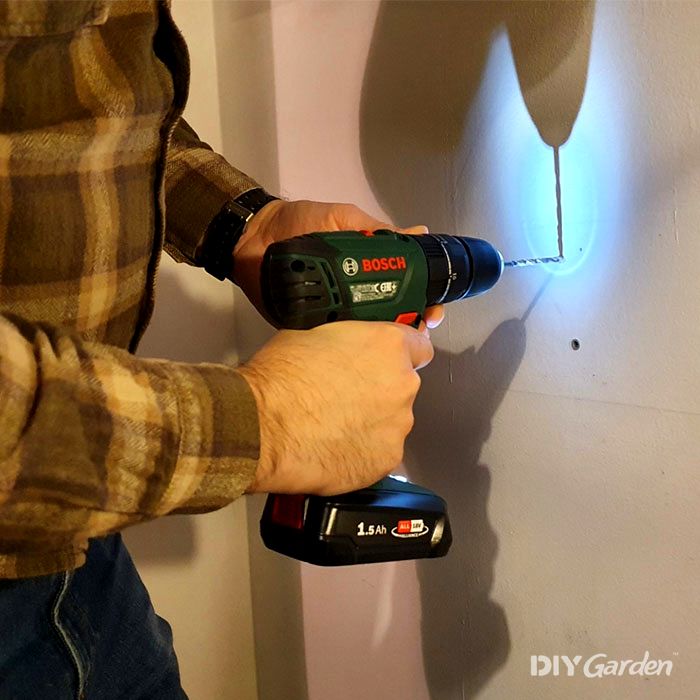
This Bosch “green” DIY drill is quite light and compact, which makes it ideal for getting into tight spaces around the home. It’s not the best grip size for people like me with big hands, but the trigger and torque selector all click around with a hefty clunk. It feels well-made and should last for ages.
With 1,350 rpm to play with and 20,250 bpm in hammer mode, this drill can occasionally be a little sluggish, although you do get 38 Nm of torque though. It’s obviously not the most powerful drill that Bosch make, but it’s fine for light use around the home and garden.
Did you find this review helpful?
2. Terratek 18V Cordless Drill Driver Kit[ SAVE 14% ]
Best drill driver for beginners
- The best choice for beginners or home DIYers that just want to get started without spending a lot of money.
- If you want a lightweight drill, this is a solid choice. Weighing less than 1 kg it’s great if the idea of a heavy duty power drill gives you the chills.
- The grip shape is surprisingly comfortable and compares to a much more expensive drill.
- Terratek has included a small spirit level into the top of the drill casing, it’s an excellent feature to make sure you can drill accurate horizontal holes when needed.
- With a 13-piece kit including a set of drill and driver bits as well as a handy magnetic holder, there’s no putting off getting straight on with your basic DIY tasks!
- I’ve got no idea how long this cordless drill would last on a building site, but I doubt it would be for long.
- Seeing as the drill is supplied with just the one battery, you’ll need to make sure it’s always kept topped up.
- Terratek reckon charging could take between three and five hours for a full battery. Not the sort of time you want to take out of a working day waiting for your drill.
- Type
- Drill Driver
- Power
- 18V
- Batteries Supplied
- 1 x 0.8Ah
- Charge Time
- 3-5 hours
- No-Load Speed
- 0-650rpm
- Torque Settings
- 16+1
- Max Torque
- 19Nm
- Chuck Size
- 10mm
- Max bpm
- n/a
- Weight
- 0.85kg
- Accessories
- Yes, 13 pieces
- Design
- 3
- Performance
- 3
- Power
- 3
- Noise
- 4
- Safety
- 3.5
- Value for Money
- 4.5
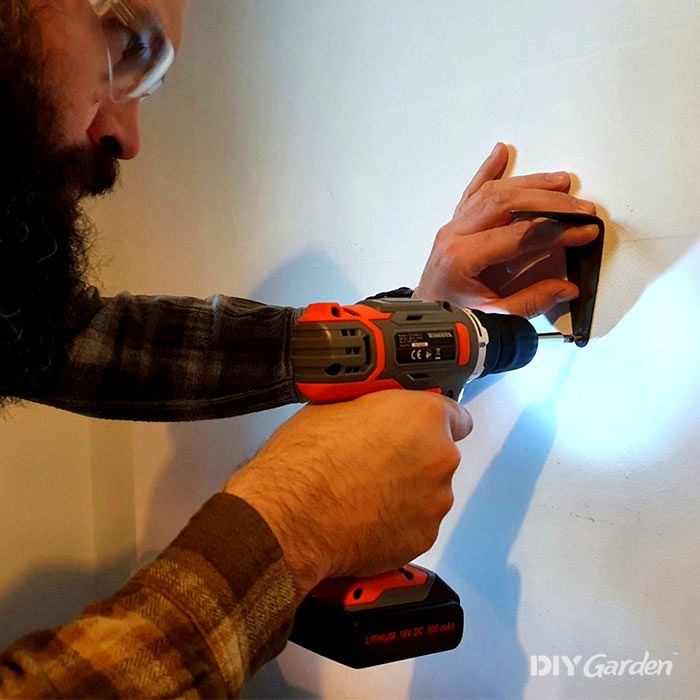
I was pleasantly surprised by the feel of this little drill. It’s rather comfortable thanks to its ergonomic grip, and it even fits my sasquatch hands! That’s where the design positives end though, as there was a fair bit of chuck wobble and one of those awful little two-part plastic chucks.
With a pitiful 650 rpm at the drilling end and less than 20 Nm of torque to play with, this is not a powerful drill. It struggled to drive home screws and didn’t drill very quickly. However, this drill is so reasonably priced that it’s good enough as a backup or emergency power tool.
Did you find this review helpful?
3. Ryobi R18PD3-215GZ 18V Cordless Hammer Drill
Best combi drill for torque control
- If you’re familiar with Ryobi’s shared battery system, you’ll know that with the two included ones you get with the kit, you can buy “naked” Ryobi tools to go with them for reasonable prices.
- With the highest number of torque controls on my list, you can really fine tune the screwing power on this drill- it’ll come in handy if you’re famous for stripping screw heads.
- This is a very affordable tool set- especially compared to a premium cordless hammer drill kit from Makita or DeWalt.
- Ryobi have included a handy double-ended screwdriver bit that clips onto the front of the drill. You can swap this out for any standard width bit, which will certainly come in handy.
- The full-size 13 mm keyless chuck is easy to adjust and feels like it grips the drill bits well.
- Ryobi don’t make power tools you’ll find on building sites- they’re wonderfully versatile for DIYers, but not quite as robust as DeWalt cordless tools for instance.
- I can’t call this a true starter kit because it doesn’t come supplied with a toolbox or case of any kind to keep everything together.
- Some users have reported problems with the batteries not holding charge or dying too quickly.
- Type
- Hammer Drill
- Power
- 18V
- Batteries Supplied
- 2 x 1.5Ah
- Charge Time
- 3 hours
- No-Load Speed
- 0-500, 0-1,800rpm
- Torque Settings
- 24+1+1
- Max Torque
- 50Nm
- Chuck Size
- 13mm
- Max bpm
- 23,400bpm
- Weight
- 1.3kg
- Accessories
- No
- Design
- 4
- Performance
- 3.5
- Power
- 4
- Noise
- 3.5
- Safety
- 4
- Value for Money
- 4
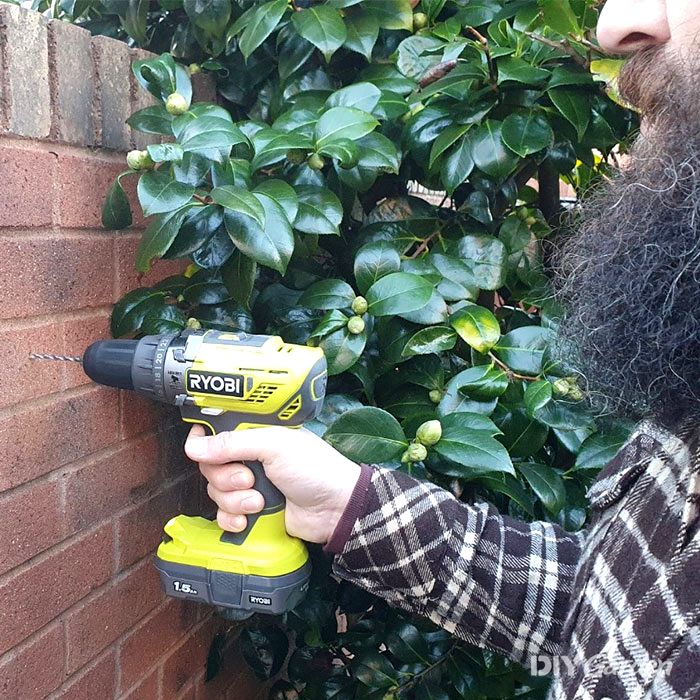
Seeing as the Ryobi R18PD3 is a big and chunky drill, it needed to be powerful to make up for the size. The screw-driving action was strong, but the drilling side of things was let down by a weird electronic speed control that made it all a bit inconsistent. Still, you get 50 Nm of torque, 1,800 rpm at the sharp end, and a decent 23,400 bpm in hammer mode.
The reason why I think this is one of the best drill kits out there, even though you don’t get a case, is because of the two batteries that come with this drill. Ryobi make a huge range of affordable bare tools, and this drill and two batteries set might be the best way to start your new tool collection!
Did you find this review helpful?
4. BLACK+DECKER BCD700S1K Lithium Ion 2 Gear Hammer Drill[ SAVE 17% ]
Best combi drill for beginners
- Compared with the much more professional DeWalt drills on my list, B+D have managed to stop any annoying battery rattle. A little spring inside the case keeps things nice and tight.
- This feels like a solid and well-made combi drill. It’s very well-balanced and nothing rattles about when you’re using it. It’s a definite step above a budget drill.
- B+D have added a handy little bit holder on the bottom of the grip section. When you’re up a ladder it’s handy to have an emergency double-ended bit when you drop your best one!
- At this price point, it’s a very wallet-friendly setup. You get a recognisable name, a decent plastic case, a battery, and a charger. What’s not to like?
- I found the grip a little bit sticky. It was quite unpleasant to use with bare hands, but I think it’ll wear down over time. It might just be a personal preference, but I didn’t like it.
- It’s a real shame that B+D have tried to save a few pennies by leaving out any type of work light. Unless you’re working in bright sunshine all day, this feels like a serious fault to me.
- This drill suffers from a small size chuck with an irritating locking system. You can only fit a maximum 10 mm drill bit, and you can’t tighten it enough with just one hand.
- The included charger is tiny, and it takes a long time to fully recharge the small 1.5 Ah battery. Be prepared for some downtime if you’re doing any heavy drilling.
- Type
- Hammer Drill
- Power
- 18V
- Batteries Supplied
- 1 x 1.5Ah
- Charge Time
- 3 hours
- No-Load Speed
- 0-360, 0-1,400rpm
- Torque Settings
- 10+1+1
- Max Torque
- 40Nm
- Chuck Size
- 10mm
- Max bpm
- 21,000bpm
- Weight
- 2.2kg
- Accessories
- Yes, 109 pieces
- Design
- 3
- Performance
- 3
- Power
- 3.5
- Noise
- 3
- Safety
- 3.5
- Value for Money
- 3.5
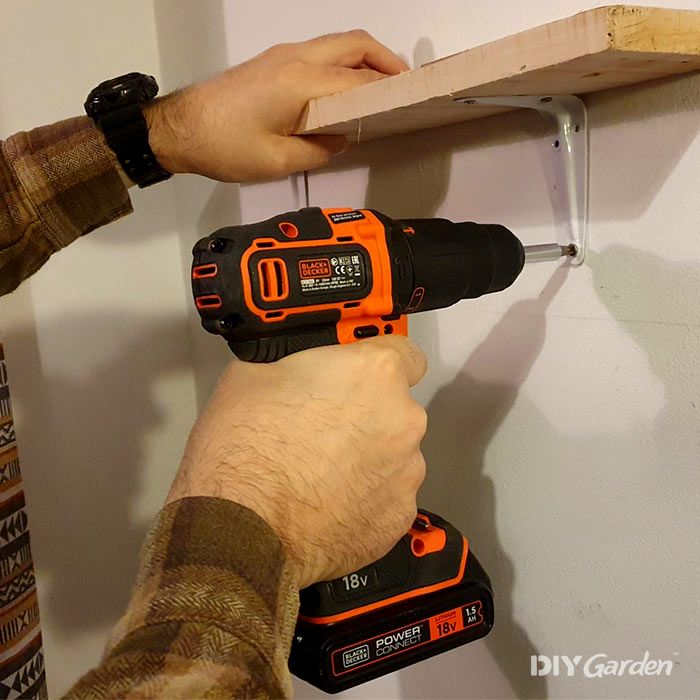
One thing I’ll give the BCD700S1K is a thumbs up in the looks department. I really like the sleek black and orange stylings, but the handle is a bit small for me. There’s just 1,400 rpm at the bit end, 21,000 bpm in hammer mode and 40 Nm of torque to play with. This tool works better at driving screws than drilling holes, but it gets the job done eventually.
On the downside, the odd two-part chuck only accommodates bits up to 10 mm. It feels a bit cheap and nasty. The lack of LED work light is unforgivable in a modern drill as well, it’s going to be impossible to use in a dark cupboard. I don’t think I’d pick this drill for many jobs.
Did you find this review helpful?
5. Makita DHP484Z 18V Combi Drill BL LXT
Best cordless drill option
- Having somewhere to put your drill when you’re up a ladder is a blessing. It might make your trousers sag a bit, but the included belt hook clip is a brilliant little addition.
- Makita’s brushless motors are as efficient as they come. Compared with the brushed motor found in the Bosch PSB 1800, you’ll get more work out of this drill for each battery.
- It’s clear that Makita use quality materials when they build their drills. The grip shape is superb, and they’ve killed off the dreaded battery rattle with rubberised stops.
- You get 54 Newton metres (Nm) of torque to play with. In terms of raw power, it’s a lot! It means that the drill is less likely to stall or bog down, even under great pressure.
- Compared with the DeWalt DCD796N, the plastic chuck isn’t going to last anywhere near as long as an all-metal one. It’s not flimsy, but you will notice the difference after a while.
- Make sure you understand before buying this drill that it doesn’t come with either a battery or a charger. Be prepared to splash out on these extras if you haven’t got them already.
- Not only does this drill come without a battery, but it also lacks a case. Compared with the amazing TSTAK case that comes with the DeWalt DCD796N, you just get a cardboard box.
- Makita have missed a trick by not including a bit holding magnet on the side of the drill. It’s a common accessory for more professional drills, but this one’s lacking.
- Type
- Hammer Drill
- Power
- 18V
- Batteries Supplied
- Bare
- Charge Time
- 1 hour
- No-Load Speed
- 0-500, 0-2,000rpm
- Torque Settings
- 21+1+1
- Max Torque
- 54Nm
- Chuck Size
- 13mm
- Max bpm
- 30,000bpm
- Weight
- 1.2kg
- Accessories
- No
- Design
- 5
- Performance
- 5
- Power
- 4.5
- Noise
- 4
- Safety
- 5
- Value for Money
- 4
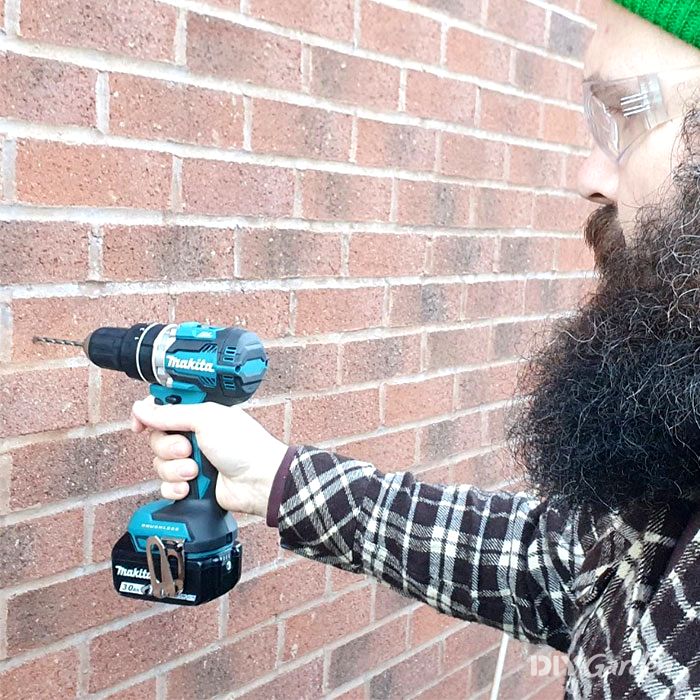
Featuring a reliably solid build and premium materials in its construction, the Makita isn’t as flashy as the DeWalt DCD796, but it has a greater level of attention to detail. If you hate rattles and odd noises, this is the best drill for DIYers that like a bit more quality. Stats-wise, it’s almost on top with 54 Nm of torque, 30,000 ipm in hammer mode and 2,000 rpm under the hood.
The only thing that holds the Makita back here is that it’s a seriously bare tool. It doesn’t come with anything more than a cardboard box and a belt hanging hook. Unless you’ve already got Makita batteries and a charger, this could get expensive quite quickly.
Did you find this review helpful?
6. Dewalt DCD796N 18V XR Li-Ion Brushless Compact Combi Drill
Best cordless drill for professionals
- The power you get from DeWalt’s brushless motor is seriously impressive- a maximum speed of 2,000 rpm is more than enough power for any cordless drilling job.
- It’s not just the rpm that’s class-beating, but with a maximum torque of 70 Nm under the bonnet, the DCD796N will power through the hardest timber, concrete, or metal when you need it to.
- Buying a “bare” tool is a smart way to save money if you’ve already got DeWalt’s excellent XR, or “eXtreme Runtime” li ion batteries. You can get hold of this professional-quality cordless drill for a lot less than you might think.
- DeWalt are famous for their build quality, it’s why they’re used by professionals across the world. Everything about this drill from the all-metal chuck to the supremely comfortable grip is built to last.
- The led light built into the drill has three brightness settings and stays on after you release the trigger, which comes in handy when you’re working in tight spaces.
- Don’t expect this cordless drill to come with batteries, a charger or even a single screwdriver bit. It’s a “bare” tool after all.
- Some users have found problems with the drill chuck brake engaging at high rpm.
- You need to take care that you don’t overtighten the keyless chuck on drill bits as it can affect the mechanism over time.
- Type
- Hammer Drill
- Power
- 18V
- Batteries Supplied
- Bare
- Charge Time
- 1 hour
- No-Load Speed
- 0-550, 0-2,000rpm
- Torque Settings
- 15+1+1
- Max Torque
- 70Nm
- Chuck Size
- 13mm
- Max bpm
- 34,000bpm
- Weight
- 1.3kg
- Accessories
- No
- Design
- 4
- Performance
- 5
- Power
- 5
- Noise
- 3.5
- Safety
- 4
- Value for Money
- 4
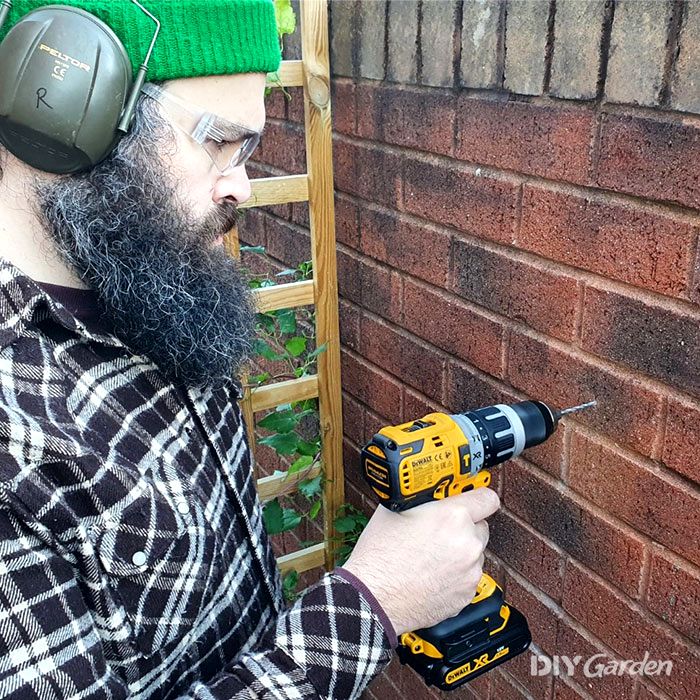
What really sets this drill apart from the competition though is the impressive amounts of metal used in its design. The only drill on my list to boast an all-metal chuck, you can tell straight away that this tool is built to last. It puts out 2,000 rpm, has the highest level of torque at 70 Nm, and blows away the rest with a huge 34,000 bpm in hammer mode. What’s not to like?
As a bonus, you can use this combi drill as a powerful work light. Rather than a weak LED that would struggle to light up a kitchen cupboard, the DCD796 has three different levels of light to illuminate your workspace. It’s a masterful piece of kit that comes with a professional-level case too. I love it! I just wish the battery would stop rattling about…
Did you find this review helpful?
7. Hychika DD-12BC Cordless Drill Driver Kit[ SAVE 15% ]
Best small drill driver
- This is a seriously streamlined little drill. It’s compact and lightweight, making it ideal for casual DIYers that still demand high performance.
- I was initially put off by this drill’s less powerful 12 Volt battery system. However, after thoroughly testing it, it’s no less powerful than the 18 Volt drills I used!
- The little tool roll supplied with this drill is excellent. The quality of the individual accessories is good, and the roll makes it easy to slip in a pocket. Much preferable to plastic bags!
- Even though this counts as a budget tool, it’s got a well-designed grip, two gears, and it’s got plenty of grunt to get the job done. This is a real bargain unless you want hammer mode.
- I can’t get by the fact that this little drill doesn’t come with a hammer mode. It’s a real shame, because most DIYers will need to drill into masonry at some point.
- The soft tool bag that this drill kit comes in is nowhere near as protective as a hard plastic case. Compared with the DeWalt DCD776 case, this drill will get knocked about too easily.
- Having a small size 10 mm chuck limits this drill’s usability. Most DIYers will still end up trying to drill a 13 mm hole for a big wall anchor at some point. It’s a bit of a shame.
- The work light is rather underpowered. Compared with the extremely powerful work light on the DeWalt DCD796N, this weak light will only just about illuminate those dark corners.
- Type
- Drill Driver
- Power
- 12V
- Batteries Supplied
- 1 x 1.5Ah
- Charge Time
- 1 hour
- No-Load Speed
- 0-400, 0-1,500rpm
- Torque Settings
- 21+1+1
- Max Torque
- 30Nm
- Chuck Size
- 10mm
- Max bpm
- n/a
- Weight
- 2.2kg
- Accessories
- Yes, 22 pieces
- Design
- 4
- Performance
- 4
- Power
- 3
- Noise
- 4
- Safety
- 4
- Value for Money
- 4
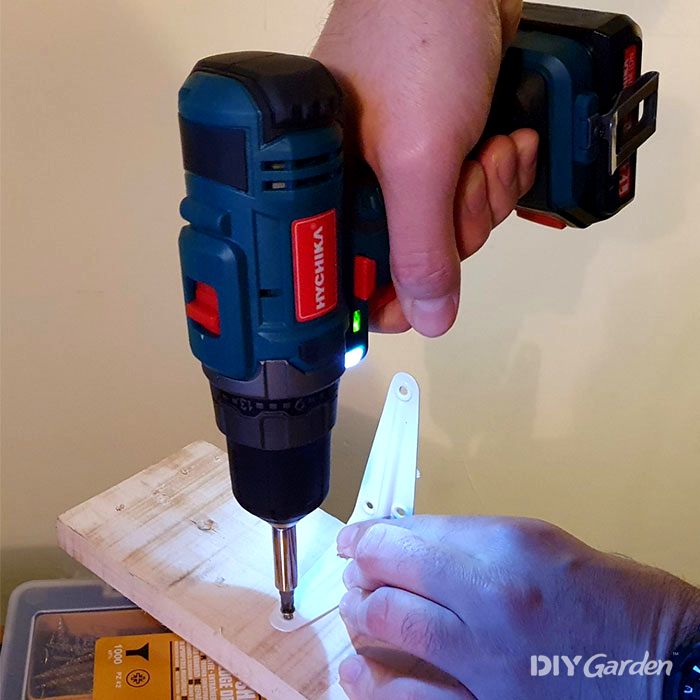
With a comfortable grip and lightweight body, it’s ideal for smaller hands and getting into tight spaces. The little 10 mm chuck can’t fit big bits, but if you’re just using it around the house you’re not likely to use one anyway. You get an adequate 1,500 rpm at the business end and 30 Nm of torque to play with. One of the big drawbacks of this drill is the lack of hammer mode though, if you want to put holes in bricks it’ll take too long.
The other thing I really liked about this set is the accessory kit, although I don’t think the bag it comes in will protect it from damage. You do get a brilliant little tool roll filled with useful bits to get started. This pint-sized drill will get the job done even if it only comes with one battery.
Did you find this review helpful?
8. DeWalt DCD776C1 18V Cordless Combi Drill
Best drill for quality and value
- This is a very competitively priced starter kit for anyone that wants to buy into DeWalt’s excellent range of cordless drills.
- You get one of DeWalt’s high performing 1.3 Ah XR or “eXtreme Runtime” batteries and a fast charger thrown in, alongside a sturdy carry case to keep it all together.
- I’ve always been a fan of DeWalt’s grip design compared to some of the other professional tool brands. The rubberised surface provides a comfortable, positive grip and helps to keep vibration down to a minimum.
- The variable speed trigger setup is responsive and comfortable to use.
- The work light, just like on other DeWalt drills, stays on for a few seconds after you let go of the trigger, it’s handy when you’re working inside dark cupboards!
- Even though this is a cordless drill kit, you only get one battery- if it runs out on a job, you’ll have to wait for it to recharge before working again.
- The 1.3 Ah lithium ion battery is fine for most DIY jobs, but if you’re planning on doing a lot of heavy work you should invest in some higher capacity batteries.
- Compared to some of DeWalt’s incredible brushless drills, this one lacks some high end torque and rpm.
- Type
- Hammer Drill
- Power
- 18V
- Batteries Supplied
- 1 x 1.3Ah
- Charge Time
- 1 hour
- No-Load Speed
- 0-450, 0-1,500rpm
- Torque Settings
- 15+1+1
- Max Torque
- 42Nm
- Chuck Size
- 13mm
- Max bpm
- 25,550bpm
- Weight
- 1.3kg
- Accessories
- No
- Design
- 3.5
- Performance
- 4
- Power
- 3.5
- Noise
- 3.5
- Safety
- 4
- Value for Money
- 3.5
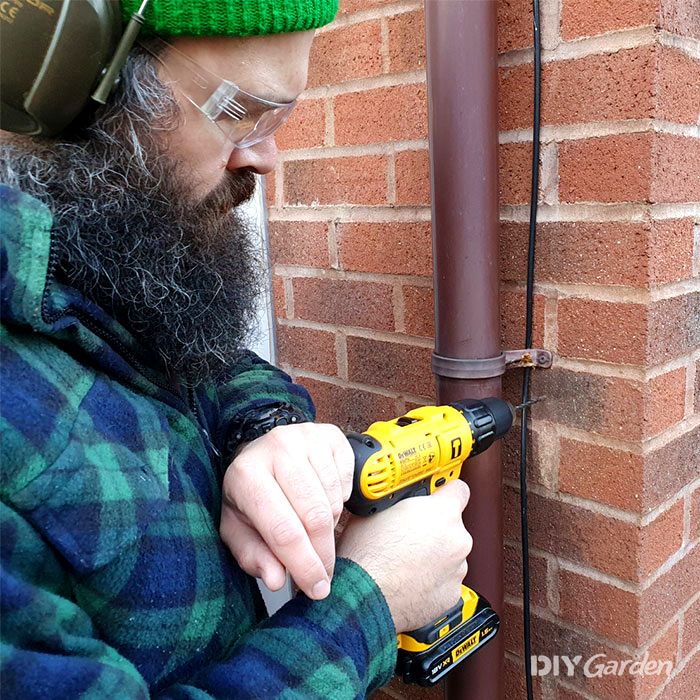
This is a time-tested drill design that might not be the most compact but feels rock-solid and pretty much bulletproof. I’ve got no doubt that this drill will last for a long time whether on a building site or in your workshop. The 1,500 maximum rpm is good enough, 42 Nm of torque does the job, and 25,500 bpm in hammer mode is plenty for drilling in clockwork.
If you don’t want to splash out on a pro-level brushless drill but want a drill set from one of the best names in the business, the DCD776 is ideal. It might not have the most impressive stats or the most up-to-date shape, but this is a trustworthy bit of kit that comes with batteries included.
Did you find this review helpful?
Product Tester
I tested various drills from a range of manufacturers to identify the best cordless drill drivers and combi drills for everyday use as well as heavy-duty usage. I assessed each model in 7 key areas:
- Design: In my review, I factored in the size and weight of each drill, as well as their grip size (with the optimal being between 12 – 16 mm). Drills with brushless motors were rated higher, as this design regulates the drill’s power and prevents wear and tear on the mechanical components, meaning the tool will last longer. When comparing chuck sizes, drills with 13 mm chucks were rated better for heavy-duty use, whilst drills with 10 mm chucks were rated less versatile but better for lighter tasks.
- Performance: To test each drill’s performance, I used them on different materials such as masonry, wood, block, steel, and other metals. If they performed well with many of these, they received a better rating. But if they struggled with two or more different materials, they got a lower rating.
- Power: My tests on power consisted of assessing the torque, RPM, and hammer function IPM. Any drills below 20 Nm torque, as they struggled with both light and heavy-duty tasks. Drills with 40 Nm torque had better versatility and were able to complete light and heavy-duty tasks, so they scored the best. Drills with less than 20,000 max BPM also got seriously marked down, as this significantly impacted the drill’s power and performance. Drills with hammer modes had more power, so these were rated higher for heavy-duty use.
- Noise: I assessed the noise levels of each of the drills, trying them out on different surfaces and in different room sizes. Models with almost 100 dB of noise were rated lowest on noise levels because these were loud, even with ear protection, whereas models that produced around 90 – 95 dB of noise were ranked much higher, as these were a more comfortable volume.
- Battery: Battery life and charging time are also important to consider. Drills using less than 1.5 Ah batteries were marked down, as this doesn’t give you enough battery life to do even some small tasks. Batteries that took longer than 1.5 hours to charge were also rated down as this is too long for the average user to wait.
- Safety: When reviewing each drill’s safety, I tested whether they had an ergonomic design if the trigger mechanism was sensitive and responsive, and if the chuck securely held the drill bits during operation. Models with lock-on buttons and LED lights were rated higher as they improved safety and visibility. Also, I read each of the model’s user manuals and safety instructions to ensure they were adequately detailed and clear.
- Value for Money: The models that offered the most power and additional features for the lowest price were rated as the best value for money. If they were able to handle heavy-duty as well as lighter tasks, these were also rated as better value for money than drills that could only perform specific jobs.
Compare Product Features
Use the dropdown to sort the table by the feature you want to see.
Bosch PSB1800 18V Cordless Hammer Drill
- 3.7
- Hammer Drill
- 18V
- 2 x 1.5Ah
- 1 hour
- 0-400, 0-1,350rpm
- 20+1+1
- 38Nm
- 10mm
- 20,250bpm
- 1.15kg
- No
Terratek 18V Cordless Drill Driver Kit
- 3.5
- Drill Driver
- 18V
- 1 x 0.8Ah
- 3-5 hours
- 0-650rpm
- 16+1
- 19Nm
- 10mm
- n/a
- 0.85kg
- Yes, 13 pieces
Ryobi R18PD3-215GZ 18V Cordless Hammer Drill
- 3.8
- Hammer Drill
- 18V
- 2 x 1.5Ah
- 3 hours
- 0-500, 0-1,800rpm
- 24+1+1
- 50Nm
- 13mm
- 23,400bpm
- 1.3kg
- No
BLACK+DECKER BCD700S1K Lithium Ion 2 Gear Hammer Drill
- 3.3
- Hammer Drill
- 18V
- 1 x 1.5Ah
- 3 hours
- 0-360, 0-1,400rpm
- 10+1+1
- 40Nm
- 10mm
- 21,000bpm
- 2.2kg
- Yes, 109 pieces
Makita DHP484Z 18V Combi Drill BL LXT
- 4.6
- Hammer Drill
- 18V
- Bare
- 1 hour
- 0-500, 0-2,000rpm
- 21+1+1
- 54Nm
- 13mm
- 30,000bpm
- 1.2kg
- No
Dewalt DCD796N 18V XR Li-Ion Brushless Compact Combi Drill
- 4.3
- Hammer Drill
- 18V
- Bare
- 1 hour
- 0-550, 0-2,000rpm
- 15+1+1
- 70Nm
- 13mm
- 34,000bpm
- 1.3kg
- No
Hychika DD-12BC Cordless Drill Driver Kit
- 3.8
- Drill Driver
- 12V
- 1 x 1.5Ah
- 1 hour
- 0-400, 0-1,500rpm
- 21+1+1
- 30Nm
- 10mm
- n/a
- 2.2kg
- Yes, 22 pieces
DeWalt DCD776C1 18V Cordless Combi Drill
- 3.7
- Hammer Drill
- 18V
- 1 x 1.3Ah
- 1 hour
- 0-450, 0-1,500rpm
- 15+1+1
- 42Nm
- 13mm
- 25,550bpm
- 1.3kg
- No
How to Choose The Best Cordless Drill
A Drill for Every Task
Drill drivers are the best cordless tool for driving screws and drilling holes, but for a perfect job, you’ll need to control the variable speed and torque. For drill speed, use low speed for screws and high speed for hole drilling.
Torque control is important for more precise tasks, such as putting screws into delicate materials such as plasterboard. Selecting a lower torque number will avoid over-tightening and help protect the surface. When you need more power to drive a screw through hardwood, for example, increase the torque number.
When it comes to drilling holes in masonry, brick or stone, you’ll need a drill with hammer action – aka the combi drill (for the cordless version) – just try drilling into a brick wall without the hammer mode on and you’ll see.
It’s always a good idea to practise on scrap material to improve your skills and confidence.
READ NEXT: How to drill into absolutely anything!
Battery Life
The days of corded drills are numbered when the best cordless drills all come with excellent and fast-charging batteries, but not all batteries are made the same…
Battery capacity is important. The capacity (measured in Amperes per hour – Ah) denotes how long the battery will last before it needs recharging. The downside is greater capacity means a larger and heavier battery.
However, manufacturers design their tools in the most ergonomically friendly way to compensate for battery size and weight. They slot into the handle or slide into the base of the drill for optimum balance.
Battery chemistry is also important. These days Lithium-Ion batteries are the most popular- they’re a little more expensive than old-style NiCad and NiMH batteries, but they’re lighter, hold their charge for longer and can be charged and discharged hundreds of times without any significant loss in performance.
Bigger Battery or Multiple Batteries
The best battery you have is the one that’s charged up when you need it. If you’re a professional user you’ll need a big 5.0 Ah lithium-ion battery to drill hundreds of holes per day, but for most DIYers this is excessive. Keep costs down with a 1.5 or 2.0 Ah battery that will last long enough for most tasks, or even better, go for a kit like the Bosch PSB1800 and get two batteries with your drill. Just remember to keep one on charge while you’re working.
Battery Power
The most important feature of a cordless drill is battery power. You need more power for drilling or driving into more resilient materials or drilling deeper holes. Power comes from the battery and is denominated in Volts, typically 12 or 18 Volts.
Power consists of a combination of speed and torque. Speed can be considered rotational force in a vertical plane whilst torque can be described as a twisting motion in a horizontal plane. Speed and torque are inversely proportional. Higher speeds are better for drilling and greater torque is better for driving. Torque is rated in Newton Meters (Nm) – the higher the number- the more power you have to play with.
Cordless Drill FAQs
Depending on what you need to drill into, there’s a drill bit that does the job. For wood, use a wood bit that has a sharp point and wide flutes to remove the chips. For metal, use a high-speed steel (HSS) drill bit that is specially hardened and coated to stay cool. Just remember that drill drivers are not designed for use on blockwork, so don’t buy masonry drill bits for that task.
READ NEXT: The Best Drill Bit Sets
When the hammer action is selected and the trigger is depressed the drill starts rotating and the motor engages a clutch and ratchet mechanism that vibrates the drill bit up and down over a tiny distance, but at many thousands of beats per minute, in order to penetrate hard material.
Although some force is applied to the drilling action by the weight of the tool alone you may need to actively apply more pressure depending on the depth you are drilling and the resistance of the material.
Using the side handle and two hands allow you to exert this pressure in the most comfortable way. When you don’t want to hammer simply turn off the hammer mode so the drill behaves like a traditional drill.
Always use a masonry drill bit rather than a standard drill bit when using the hammer action, as the drill bit is stronger and the two wings on the drill bit force the waste material back up to keep the hole clean. Also, standard drill bits would get hot quickly and go blunt very easily.
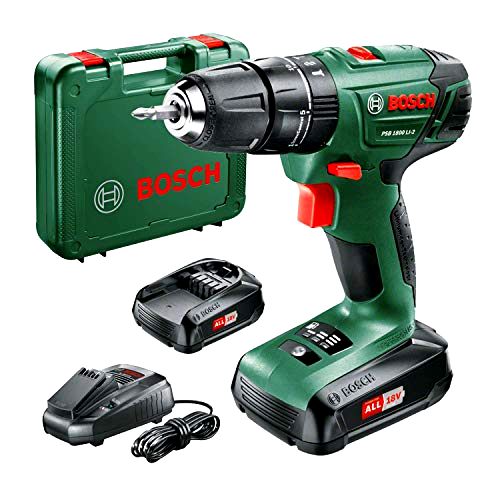
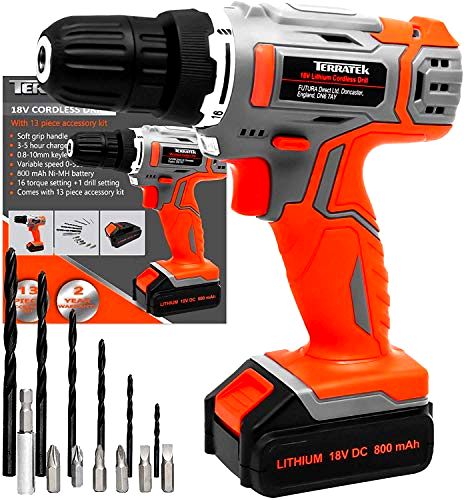
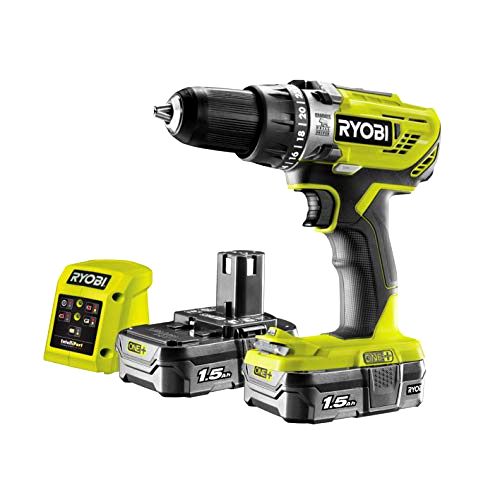
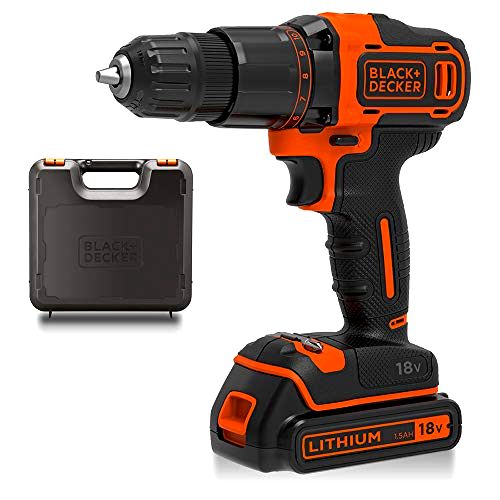
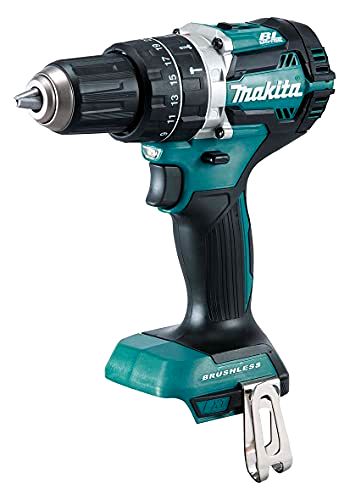
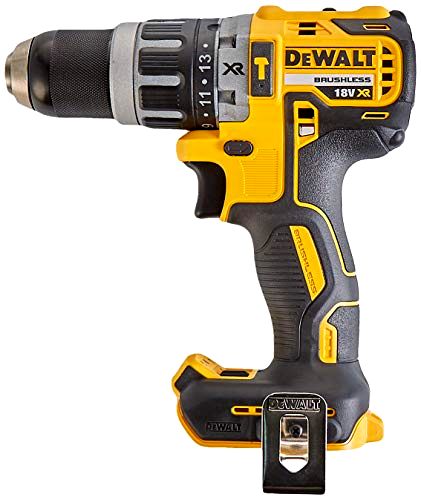
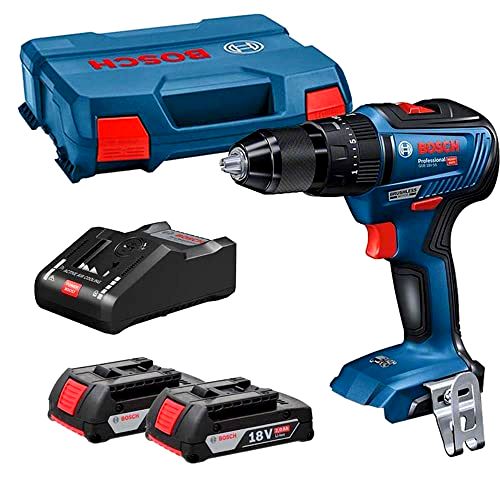
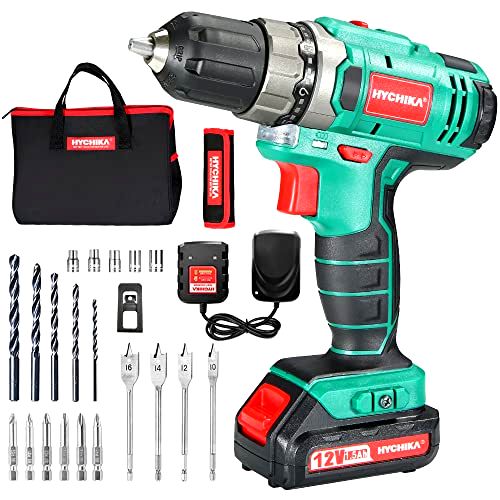

Share